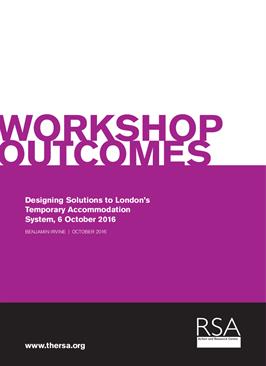Using design thinking to transform the dysfunctional system of temporary accommodation in London.
On the 6th of October 2016 the RSA and Policy Lab held a day workshop to explore solutions to the number of households in temporary accommodation in London. The workshop brought together senior housing officers, registered providers, homelessness charities, social enterprise and the department for communities and local government (DCLG). The workshop was supported by Trust for London.
Participants mapped the dynamics of homelessness prevention and temporary accommodation provision, viewed video ethnographies to understand user needs and experiences and heard from four inspirational initiatives that have demonstrated potential to improve outcomes for homeless households.
Presentations included:
- Lewisham Borough Council’s PLACE/Ladywell development, using modern construction methods to provide high quality temporary homes on vacant land.
- Justlife Foundation’s work to raise standards in unsupported temporary accommodation through local level temporary accommodation boards.
- Resonance and St Mungo’s Real Lettings model which combines Local Authority and private social investment to purchase properties councils can access for temporary accommodation.
- Shared Lives Plus, the UK network for Homeshare schemes, where householders who require help to live independently are matched with those with a housing need.
This report describes the findings from the workshop including the ideas developed by participants. These ideas included proposals to:
- Prevent crisis homelessness through early action and reform of the private rented sector to make it more stable and affordable.
- Teach knowledge and life skills for avoiding homelessness in schools. Including tenancy agreements, financial literacy and housing rights.
- Give councils powers to compulsory purchase underused non-residential sites at existing use value to deliver affordable or social housing.
- Set up a pan-London vehicle for directing the delivery of multi-tenure housing developments which would fund affordable/social housing by co-investing public land into schemes rather than selling it.
Areas identified for further research included:
- Better understanding the impact of living in temporary accommodation, particularly understanding outcomes for households who are placed in settled accommodation through a long distance out of area move.
- Whether instances of repeat homelessness have increased since councils have been able to place homeless households back into the private rented sector on short term tenancies.
- Establishing the full additional cost to the public purse of households living in temporary accommodation. This was last estimated at £500m in 2004.
- A comparative evaluation of the different approaches councils are taking to procure housing to replace temporary accommodation to assess their effectiveness and viability - including the costs and the numbers of properties and households involved.
- Action to increase the knowledge and confidence of London councils to commission affordable housing development on their own sites using innovative building and financing methods.
Download the workshop outcomes: Designing solutions to London’s temporary accommodation system: workshop outcomes (PDF, 218KB)
Read the temporary accomodation briefing report which can be referred to for more detail on some of the issues discussed here.
pdf 342 KB
Contributors

